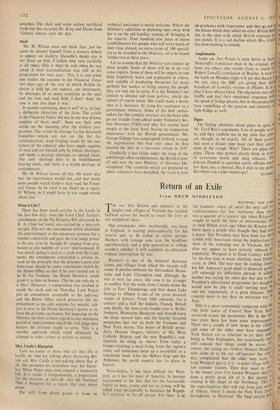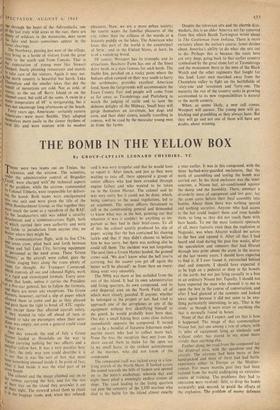Return of an Exile
From DREW MIDDLETON
WESTPORT, NEW yOlt/' rrran war that flickers and splutters, in the I jungles and villages of Vietnam has reached halfway across the world to touch the lives of our neighbours here.
Our postmaster, who, incidentally, was born in England, is waiting philosophically for his reserve unit to be called to active service. Mothers with teenage sons scan the headlines apprehensively and a new generation at college wonders whether it will complete its education without interruption by war.
Westport is one of the hundred thousand towns and villages from which the recruits will come. it perches between the Adirondack Moun- tains and Lake Champlain and, although the war is very far away, this area is no stranger to conflict. For the route from Canada down the lake to Fort Ticonderoga and then down Lake George to Albany is one of the great invasion routes of history. From 1666 onwards, for a century and a half the Indians, French, British and, finally, the Americans fought over it. Wolfe, Amherst, Montcalm, Burgoyne and Arnold knew the deep, narrow lake and the heavily forested mountains that rise on both the Vermont and New York shores. The bones of British grena- diers, Hessian Jaegers, infantry of His Most Catholic Majesty and the new Republic's con- tinentals lie along its shores. Even today a farmer wresting a hard living from the region's rocky soil sometimes turns up a sword-hilt or a tomahawk head. Like the Belfort Gap and the Ardennes, the north country has its place in history.
Nevertheless, it has been difficult for West- port, as it has for most of America, to become accustomed to the idea that for the foreseeable future its men, young and not so young, will be called away periodically to maintain the Repub- lic's position in far-off places. Yet there is at
the moment—when all await ,the next call let reinforcements—far less resistance than there was a quarter of a century ago when Rdosevelt sought to teach the fats of international life' or even fifteen years ago when the Korean vv3r burst upon a people who thought they had won a peace. The President may have been less than candid with Americans about the implications 1°, them of the widening war in Vietnam, but it does not appear to have severely reduced his popularity. Westport is in Essex County, which' for the first time in many elections, went Demo' cratic in 1964. The war may be coming closer' but Mr. Johnson's good deeds in domestic polia still outweigh his difficulties abroad. A village mother was saying the other day that due to the President's educational programme her daugliter would now be able to study nursing near by and n0t, expensively, at a great distance. This counted more to her than an uncertain war at Asia.
This is a poor community compared with the rich farm towns of Central New York SOIL; westward across the' mountains. But in the la' two years there ha's been some improvement' There are a couple of new shops in the villa; and some of the older ones have expanded' York Staters are as reluctant to air their weir being as New Englanders, but occasionally they will concede that things could be worse. 01 course, the young are restless. Stewart Dougall; who came in to fix our refrigerator the oat' day, complained that the older men want I° keep Westport just as it is: a quiet village with few summer visitors. They may want to an "e in the twenty years I've known Westport they done a pretty good job of it. But change coming in the shape of the Northway. This I," the super-highway that will run from just north of Albany, where it meets the New York Stal throuihway, to Montreal. The final section vi" ran through the heart of the Adirondacks, one of the last truly wild areas in the east; there are Plenty of wildcats in the mountains, deer swim forest lake and bears sometimes appear in the turest clearings. The Northway, passing just west of the village, may bring in a horde of visitors from the great cities to the south and from Canada. That is 11)1e expectation of young men like Stewart
ougan, busily planning restaurants and motels
take care of the visitors. Again it may not. The north country is beautiful but harsh. Lake '-hamplain and the smaller lakes that dot the *tilt of mountains are cold. Not as cold, of course, as the sea off Barry Island or on the channel coast, but cold all the same. A swim in a water temperature of 68° is invigorating, but it does not encourage long afternoons at the beach. Forty years ago, Americans-- certainly eastern Americans—were more flexible. They adapted themselves more easily to the slower rhythms of if niral• life and were content with its modest
pleasures.' Now, we are a more urban society; the tourist wants the familiar pleasures of the city rather than the stillness of the woods or a leisurely paddle on the lakes. The American who loves this part of the world is the counterpart of Strix: and in the United States, at least, he is of a vanishing breed.
Of course, Westport has its triumphs and its attractions. Bessboro Farm has one of the finest dairy herds in a state famous for such herds. The Stable Inn, perched on a rocky point where the Indians often camped on their way south to harry the settlements, provides excellent American food. Soon the fairgrounds will accommodate the Essex County Fair and people will come from as far away as Ticonderoga and Plattsburg to watch the judging of cattle and to taste the dubious delights of the Midway. Small boys will gorge themselves on ice-cream, hot dogs and corn, and their elder sisters, usually travelling in convoy, will be eyed by the muscular young men in from the farms.
Despite the television sets and the electric dish- washers, this is an older America not far removed from that which Booth Tarkington wrote about, in The Gentleman from Indiana. There is more certainty about the nation's course, fewer doubts about America's ability to do what she sets out to do. Perhaps this is because the roots here are very deep, going back to that earlier country symbolised by the great stone fort at Ticonderoga and the monument there to the men of the Black Watch and the other regiments that fought for this land. Later men marched away from the Champlain valley to fight on the battlefields of 'sixty-one and 'seventeen and 'forty-one. The maturity the rest of the country seeks in growing accustomed to its new responsibilities is natural to the north country.
When, as seems likely, a new call comes, Westport will answer. The young men will go, bitching and grumbling as they always have. But they will go and not one of them will have any doubts about winning.































 Previous page
Previous page